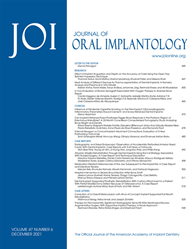
Journal of Oral Implantology
The quality and quantity of the alveolar ridge is the key to the successful implantation and long-term stability of implants
LAWRENCE, Kan. (PRWEB)
October 25, 2022
Journal of Oral Implantology – Dental implants are essential to preserve jaw structure and increase oral and physical health. Bone regeneration is vital to improving the success rate of dental implants. Guided-bone regeneration (GBR) is the standard implantologists use for creating the bone necessary for eventual implant placement. Titanium mesh is widely used in the GBR process for alveolar ridges. The titanium mesh creates and holds the space between the membrane and bone, thus allowing for the de novo bone to form. However, limitations of conventional titanium mesh are: (i) a need to be cut, (ii) the need to bend into the desire shape, (iii) increased surgical time, and (iv) possible postoperative infection.
“The quality and quantity of the alveolar ridge is a key to successful implantation and long-term stability of implants,” writes Libo Zhou, MS, MD, and colleagues from Jiamusi University, Peking Union Medical College Hospital, Beijing Citident Stomatology Hospital, and the Forth Military Medical University in Jiamusi, Beijing, and Xi’an, China. Zhou and colleagues recently published a retrospective review in the Journal of Oral Implantology to compare the use of conventional versus patient specific customized 3D-printed titanium mesh in GBR. Researchers reviewed data from nine studies focusing on: (i) study design, (ii) participant number, (iii) bone graft materials, (iv) mesh type selection, (v) operation protocol, (vi) initial bone width and height, (vii) incidence of mesh exposure, (viii) time to complications, (ix) transplantation success rate, and (x) post-GBR follow-up time. The data review included 218 patients aged 17 to 88 years and 247 titanium mesh placements. Of these, 99 were customized and 148 were conventional titanium meshes.
Researchers noted that the most common post-implantation complications were titanium mesh exposure, infection, and bone resorption. Exposure time significantly affected healing and eventual bone formation. Early exposure (2-3 weeks post-placement) negatively affected bone regeneration, while late exposure had only a small impact on bone regeneration. Results show that early exposure occurred more often with conventional titanium mesh which resulted in decreased success for bone formation, while customized titanium mesh created less exposure, resulting in greater success.
Although future research is recommended with longer follow-up times, Zhou et al determined that “the exposure rate of customized titanium mesh is lower than that of conventional titanium mesh, which is more advantageous in the treatment of complex bone defects. Advantages of 3D printed customized titanium mesh are: (i) avoids nerves and blood vessels, (ii) improves the reconstruction accuracy of GBR, (iii) provides enough bone volume for eventual dental implant placement, (iv) reduced exposure rate, and (v) improved surgical success rates. An additional factor for GBR success is the prevention of soft tissue dehiscence through proper understanding of technique sensitive soft tissue closure procedures.
Full text of the article, “Effect of Exposure Rates with Customized Versus Conventional Titanium Mesh on Guided Bone Regeneration: Systematic Review and Meta-Analysis” Journal of Oral Implantology, Vol. 48, No. 3, 2022, is available at https://doi.org/10.1563/aaid-joi-D-20-00200
###
About the Journal of Oral Implantology
The Journal of Oral Implantology is the official publication of the American Academy of Implant Dentistry and of the American Academy of Implant Prosthodontics. It is dedicated to providing valuable information to general dentists, oral surgeons, prosthodontists, periodontists, scientists, clinicians, laboratory owners and technicians, manufacturers, and educators. The JOI distinguishes itself as the first and oldest journal in the world devoted exclusively to implant dentistry. For more information about the journal or society, please visit http://www.joionline.org.
Media Contact:
Samantha Weinkauf
Allen Press, Inc.
785/865-9123
sweinkauf@allenpress.com
Share article on social media or email:

